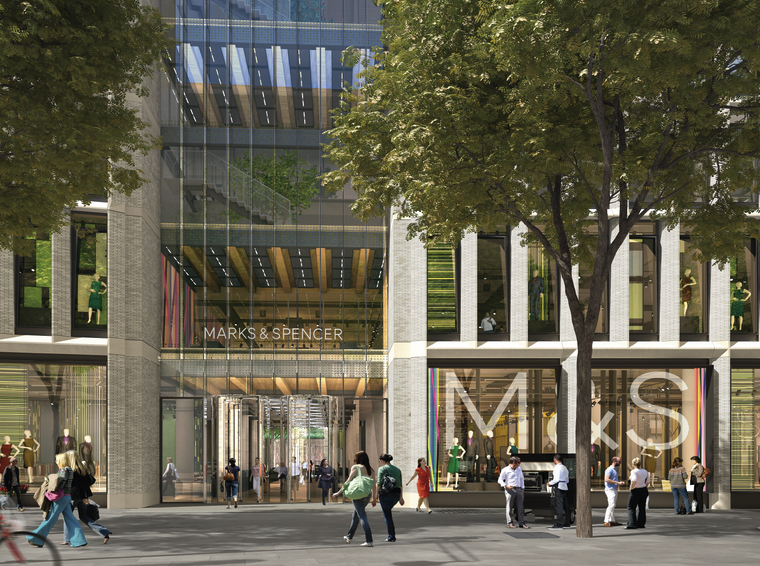The Secretary of State for Housing, Communities and Local Government has granted approval for the redevelopment of the M&S store at Marble Arch in London. M&S first submitted a planning application to redevelop the store in March 2021.
M&S CEO, Stuart Machin said: “I am delighted that, after three unnecessary years of delays, obfuscation and political posturing at its worst, under the previous Government, our plans for Marble Arch – the only retail-led regeneration proposal on Oxford Street – have finally been approved. We can now get on with the job of helping to rejuvenate the UK’s premier shopping street through a flagship M&S store and office space, which will support 2,000 jobs and act as a global standard-bearer for sustainability.
“We share the Government’s ambition to breathe life back into our cities and towns and are pleased to see they are serious about getting Britain building and growing. We will now move as fast as we can.”
Supporting Oxford Street
M&S says now is the time to regenerate the West End to regain its position on the world stage as a global shopping destination:
- As of May, footfall is 30% down on pre-pandemic levels, compared with just 15% further east.
- The M&S investment in Marble Arch is the only retail-led regeneration on the street.
- Savills reported that the closure of the M&S store would be ‘catastrophic’ for the immediate retail environment.
Oxford Street is now recovering, but vacancy rates remain high at c.15%, roughly three times as high as the pre-pandemic (2019) level:
- Investment from other retailers on the street such as IKEA, HMV and Uniqlo, and plans to pedestrianise the street by the Mayor of London are signs of this recovery, but our M&S Marble Arch store is integral to that regeneration of the West End.
Supporting Sustainability
The new building will be among the top 1% of new buildings in London on sustainable performance:
- It will use less than a quarter of the energy of today’s structure, with 95% of the existing building materials recovered, recycled or reused and the water consumption halved.
- The proposed building has a design life of 120 years and carbon payback within 11 years of construction.
- Since the initial proposal, M&S has committed to reduce the whole life carbon of the development by a further 10%.
- A whole life carbon assessment (WLCA), undertaken by leading environmental consultants Arup, concluded that the new build offered significant sustainability advantages over a refurbishment. Reduction in building regulated operational energy well exceeds the Government’s stated 78% carbon reduction target by 2035.
M&S said that while its aim was always to consider refurbishment first, it was not possible to retrofit the Marble Arch site into a new, modern flagship store.
- The team tested 16 different plans to retrofit a flagship store, all of which were untenable due to the complexity of the site which is made up of three different buildings – of different heights, sizes and age. This was accepted by an independent planning inspector in the public inquiry.
- Even a heavy refurbishment is highly likely to involve more embodied carbon and leave its structural flaws unremedied, limiting our options to improve energy use.
M&S said that now more than ever, we need private investment to ensure our towns and cities are not left behind.
“We submitted an application for planning permission to redevelop Marble Arch in March 2021. More than three years on, we and others in the property industry have eagerly awaited an answer from the Government over whether the development can go ahead. Marble Arch is seen as a test case for our outdated and stagnant planning system, and the decision will be felt across the business industry,” it stated.
Supporting Heritage
The Marble Arch store remains unlisted despite two previous listing applications to English Heritage:
- Montagu Evans’ analysis demonstrates that the built environment surrounding Selfridges, neighbouring the Marble Arch site, is a mix of buildings of varying ages and architectural merit, and firmly concludes that the new M&S store would improve, not harm, this setting, including by replacing a congested side road with a new pedestrian area, removing unsightly and light-limiting street level canopies and introducing new tree-lined public spaces.
M&S said it always seeks to retrofit first – in Chelmsford, Cheltenham, and most recently in Brixton, it has breathed new life into buildings, whilst respecting and preserving their heritage. In other locations, including Stevenage, Dundee and Selby it has taken over and regenerated sites that were laying vacant.


